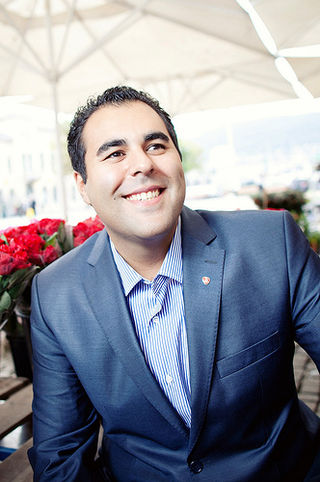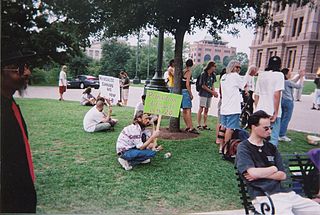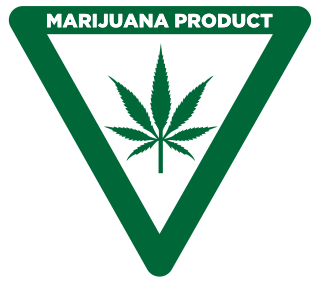The National Organization for the Reform of Marijuana Laws is a social welfare organization based in Washington, D.C., that advocates for the reform of marijuana laws in the United States regarding both medical and non-medical use.

Knut Storberget is a Norwegian lawyer and politician for the Labour Party. He is currently serving as the county governor of Innlandet since 2019. He previously served as Minister of Justice under Jens Stoltenberg from 2005 to 2011. He was also a member of parliament for Hedmark from 2001 to 2017, and deputy member for the same constituency from 1993 to 2001.

In the United States, the non-medical use of cannabis is legalized in 24 states and decriminalized in 7 states, as of November 2023. Decriminalization refers to a policy of reduced penalties for cannabis offenses, typically involving a civil penalty for possessing small amounts, instead of criminal prosecution or the threat of arrest. In jurisdictions without penalty the policy is referred to as legalization, although the term decriminalization is sometimes used for this purpose as well.

In the United States, increased restrictions and labeling of cannabis as a poison began in many states from 1906 onward, and outright prohibitions began in the 1920s. By the mid-1930s cannabis was regulated as a drug in every state, including 35 states that adopted the Uniform State Narcotic Drug Act. The first national regulation was the Marihuana Tax Act of 1937.

Drug liberalization is a drug policy process of decriminalizing, legalizing, or repealing laws that prohibit the production, possession, sale, or use of prohibited drugs. Variations of drug liberalization include drug legalization, drug relegalization, and drug decriminalization. Proponents of drug liberalization may favor a regulatory regime for the production, marketing, and distribution of some or all currently illegal drugs in a manner analogous to that for alcohol, caffeine and tobacco.
The Marijuana Control, Regulation, and Education Act, also known as California Assembly Bill 390 and later Assembly Bill 2254, is the first bill ever introduced to regulate the sale and use of marijuana in the U.S. state of California. If passed and signed into law, marijuana would be sold and taxed openly to adults age 21 and older in California. Tom Ammiano, a Democrat representing California's 13th State Assembly district, introduced this piece of legislation on February 23, 2009, arguing that the bill will "tax and regulate marijuana in a manner similar to alcohol." As introduced, this proposal is estimated to raise over $1 billion in annual revenue by taxing the retail production and sale of marijuana for adults 21 years of age and older. To obtain a commercial grow license one would pay an initial $5,000 fee, then a $2,500 fee each year after that. A tariff of $50 per ounce would also be placed on all sold and grown marijuana. The bill has gained much media attention, statewide and nationally.

In the United States, the use of cannabis for medical purposes is legal in 39 states, four out of five permanently inhabited U.S. territories, and the District of Columbia, as of March 2023. Ten other states have more restrictive laws limiting THC content, for the purpose of allowing access to products that are rich in cannabidiol (CBD), a non-psychoactive component of cannabis. There is significant variation in medical cannabis laws from state to state, including how it is produced and distributed, how it can be consumed, and what medical conditions it can be used for.
Jesse Stout is an American attorney and drug policy reform activist. He practiced business law for the cannabis industry with Greenbridge Corporate Counsel. He was appointed by the San Francisco Board of Supervisors to serve as a member of the San Francisco Cannabis State Legalization Task Force and its successor body the San Francisco Cannabis Oversight Committee. He also recruited employees for cannabis companies, through THC Staffing Group.

Masud Gharahkhani is a Norwegian politician from the Labour Party, who has been serving as the President of the Storting since 2021, and as a member of the Storting for Buskerud since 2017. He previously served as a deputy member from 2009 to 2013.
In the early 21st century, advocacy for drug legalization has increased in Latin America. Spearheading the movement, the Uruguayan government announced in 2012 plans to legalize state-controlled sales of marijuana in order to fight drug-related crimes.

Cannabis in Alabama is illegal for recreational use. First-time possession of personal amounts is a misdemeanor, punishable by up to a year in prison, a fine of up to $6000, and a mandatory six months driver's license suspension. Repeat offenses and possession with intent to sell are felonies.

The Adult Use of Marijuana Act (AUMA) was a 2016 voter initiative to legalize cannabis in California. The full name is the Control, Regulate and Tax Adult Use of Marijuana Act. The initiative passed with 57% voter approval and became law on November 9, 2016, leading to recreational cannabis sales in California by January 2018.

Cannabis in Nevada became legal for recreational use on January 1, 2017, following the passage of Question 2 on the 2016 ballot with 54% of the vote. The first licensed sales of recreational cannabis began on July 1, 2017.

Cannabis in Texas is illegal for recreational use. Possession of up to two ounces is a class B misdemeanor, punishable by up to 180 days in prison and a fine of up to $2000. Several of the state's major municipalities have enacted reforms to apply lesser penalties or limit enforcement, however.

Cannabis in Pennsylvania is illegal for recreational use, but possession of small amounts is decriminalized in several of the state's largest cities. Medical use was legalized in 2016 through a bill passed by the state legislature.

Cannabis in Michigan is legal for recreational use. A 2018 initiative to legalize recreational use passed with 56% of the vote. State-licensed sales of recreational cannabis began in December 2019.

Cannabis in Malta is decriminalised, within limits, to grow, use, and possess for adults. In 2018, the Parliament of Malta legalised medical cannabis. On 14 December 2021, the Parliament of Malta decriminalised recreational cannabis for personal possession and use for those aged 18-years-old and over, becoming the first EU country to do so.
The list includes and details significant events that occurred in the global history of national-level implementations of, or changes made to, laws surrounding the use, sale, or production of the psychoactive drug cannabis.

NORML France, previously known as Chanvre & Libertés - NORML France is a French non-profit organization based in Toulouse but active in all territories of France, whose aim is to move public opinion sufficiently to achieve the depenalization of illicit drugs consumption, the legalization of non-medical marijuana and the increased access to medical cannabis in France, so that the responsible use of cannabis by adults is no longer subject to penalty.

Cannabis rights or marijuana rights are individual civil rights that vary by jurisdiction. The rights of people who consume cannabis include the right to be free from employment discrimination and housing discrimination.














